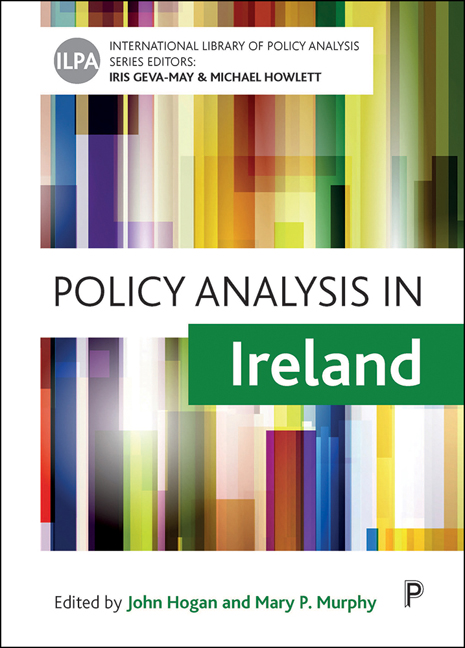Book contents
- Frontmatter
- Contents
- List of figures, tables and boxes
- List of abbreviations
- Notes on contributors
- Editors’ introduction to the series
- Acknowledgements
- Foreword
- Preface
- one Contextualising policy analysis in Ireland
- Part One: History, styles and methods of policy analysis in Ireland
- Part Two: Policy analysis at various levels of government: from local to the EU
- Part Three: Think tanks, interest groups, political parties and gender-based policy analysis
- Part Four: The public, science and the media: the wider policy analysis environment in Ireland
- Index
six - Ireland’s ‘unique blend’: local government and policy analysis
Published online by Cambridge University Press: 18 December 2021
- Frontmatter
- Contents
- List of figures, tables and boxes
- List of abbreviations
- Notes on contributors
- Editors’ introduction to the series
- Acknowledgements
- Foreword
- Preface
- one Contextualising policy analysis in Ireland
- Part One: History, styles and methods of policy analysis in Ireland
- Part Two: Policy analysis at various levels of government: from local to the EU
- Part Three: Think tanks, interest groups, political parties and gender-based policy analysis
- Part Four: The public, science and the media: the wider policy analysis environment in Ireland
- Index
Summary
There should be room in a democratic country for two levels of government, each with its area of political responsibility. The local level should not have to be compelled to live in perpetual fear of a centralising vortex. (Marshall, 1967)
Introduction
A fundamental argument in favour of local government is the building and expression of community identity. Wilson and Game (2002, p 38) argue that local authorities are the governments of particular communities and the institutions of local government ought to reflect and reinforce people's sense of place and community. Callanan (2018, p 1) observes that in Ireland the sense of distinctive local identity is strong: ‘Even in a globalised society, it seems as though people continue to attach a higher value to their locality and to localness.’ In its purest form, we are talking about a system whereby councils of elected politicians make policy decisions on behalf of their local communities. Powers are not retained at central level by national government but are held and maintained by citizens of each community (Weeks and Quinlivan, 2009, p 2). Critical to this understanding of local government is the notion of councils having substantial control of local affairs. As will be seen in the following sections, local government in Ireland is characterised by functional and financial centralisation, increasing managerialism and the rationalisation of councils through abolitions and forced mergers. Yet, it continues to provide services that are essential to the everyday lives of citizens. Policy analysis is complex in this environment but it has a crucial role to play if we are to foster a debate to improve local government and local democracy.
This chapter is divided into four main parts. After justifying the existence of local government, the first section reviews historical policy analysis functions and capacity in the Irish system. The chapter then outlines the current framework of local government in Ireland. The following section assesses the system's policy analysis, process, function and capacities. A final section examines recent reforms to build democratic participation into policy analysis processes.
Justification for the existence of local government
Spreading of power is a rudimentary justification for local government, the argument being that it is hazardous to concentrate too much power in one organ of the state. This is connected to the belief that the primary benefit of local government is that it is local and requires a local analytical frame for policy making.
- Type
- Chapter
- Information
- Policy Analysis in Ireland , pp. 79 - 92Publisher: Bristol University PressPrint publication year: 2021



